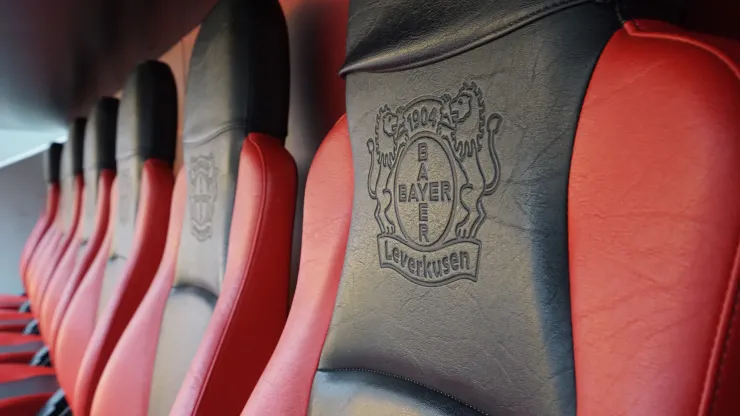A corporate owned club with plastic fans that has bought success over the last two decades. That’s the stereotype many fans of other Bundesliga clubs have of Bayer 04 Leverkusen. While Leverkusen has played in a UEFA Champions League final and has finished in a European place in six consecutive seasons, finishing second behind Borussia Dortmund in 2001-02, they have yet to win a Bundesliga title.
The reality of Bayer Leverkusen is a little more complex opposing fans want to acknowledge. Yes, the club is owned by the Leverkusen-based multinational Bayer Corporation, and the club does benefit from a yearly sponsorship of €25 million from the company. The club’s soccer operation also is a beneficiary of Bayer’s professional expertise. But Michael Schade, the CEO of Bayer 04 Leverkusen and a longtime Bayer corporation veteran, points out that Bayern Munich has a €60 million shirt deal with Adidas, while local rival Schalke 04, whose “people’s club” mantra typifies its large supporter base, gets €25 million in a shirt sponsorship from Russian petroleum giant Gazprom. By comparison, Schade claims that Leverkusen is forced to live within their means, beyond the annual sponsorship from the Bayer Corporation.
SEE MORE: German national team, Bundesliga reaping rewards of youth-centric approach.
Schade’s experience in the corporate world has him understanding the need for the Bundesliga and his club to aggressively market to fans overseas. The Premier League is years ahead of the Bundesliga as far as conquering markets in Asia and North America. Schade acknowledges this reality and believes Leverkusen, who will make a second successive trip to Florida in January, must travel to the United States as much as possible.
The club has a healthy experience in the American player market – it was first professional club for both Claudio Reyna and Landon Donovan, arguably the two best American field players of the modern era. Yet the club never aggressively sought fans in the United States until the last few years. While the Premier League was sending clubs of all sizes to the USA and Asia to grow the brand of English football, German soccer stood still, hardly venturing out of the comfort zone of Europe.
Given the large monetary advantage top-flight English clubs have over non-Bayern, Barcelona and Real Madrid Europe, Schade understands what Leverkusen must do. With the reality that the bottom team in the Premier League who is relegated to the Championship earns more in television revenue in a season than any German club (including Bayern) and that the worldwide TV rights money is only growing for the Premier League, clubs like Leverkusen have to understand where they sit in the European pecking order.
Competing with English clubs for players is difficult if money is the only factor. That is why Schade and Leverkusen see UEFA Champions League qualification as critical. Schade points to the transfer of Javier “Chicharito” Hernandez from Manchester United this past summer.
“He had some offers from English clubs to earn much more money, but he wanted Champions League,” Schade told World Soccer Talk. “This is something that is an argument for a club like ours. Players want to play Champions League and we’ve been in the competition for a couple years now. He could have easily (taken more money) to play for clubs six. through 13 in England but choose us.
Chicharito also serves as a valuable marketing tool in the Americas, fitting Leverkusen’s strategy of aggressively courting fans abroad. The player’s value is perhaps greater to a club like Bayer 04 Leverkusen than it would be to a mid-level Premier League club who has already penetrated the American market thanks to previous tours of North America and the EPL’s lucrative NBC Sports deal.
But at the same time, Schade understands Bayer must be a smart club in the transfer market. The club’s scouts are covering the globe looking for bargain players to bring to Germany. This is a two decade tradition for a club who brought Reyna to the Bundesliga straight out of the University of Virginia in 1994, and at the same time was building the best scouting network of any German club in the Americas. What resulted was a club that served as the entry point to top-level European football for several outstanding Brazilian players, including Emerson, Ze Roberto and Lucio.
Today, Leverkusen’s outstanding scouting network continues to unearth players far and wide. But in the landscape of 2015, that often means developing foreign talent and selling when they reach peak value. One such example Schade points to is that of Son Heung-min, who was acquired for €10 million in 2013 but sold on to Spurs for €30 million, yielding a short-term profit Bayer can sink into operations and the player market. The Leverkusen CEO understands that in this era of Premier League clubs paying a premium for players. Creating commodities and value in the transfer market benefits his club.
The commitment of Bayer 04 Leverkusen to exploring new markets is refreshing coming from a Bundesliga club. If Leverkusen finds success with this strategy, expect more Bundesliga clubs to spend the winter and summer breaks in North America or Asia.
SEE MORE: Despite positives, Bundesliga faces uphill climb in United States.
200+ Channels With Sports & News
- Starting price: $33/mo. for fubo Latino Package
- Watch Premier League, Women’s World Cup, Euro 2024 & Gold Cup
The New Home of MLS
- Price: $14.99/mo. for MLS Season Pass
- Watch every MLS game including playoffs & Leagues Cup
Many Sports & ESPN Originals
- Price: $10.99/mo. (or get ESPN+, Hulu & Disney+ for $14.99/mo.)
- Features Bundesliga, LaLiga, Championship, & FA Cup
2,000+ soccer games per year
- Price: $5.99/mo
- Features Champions League, Serie A, Europa League & Brasileirāo
175 Premier League Games & PL TV
- Starting price: $5.99/mo. for Peacock Premium
- Watch 175 exclusive EPL games per season








